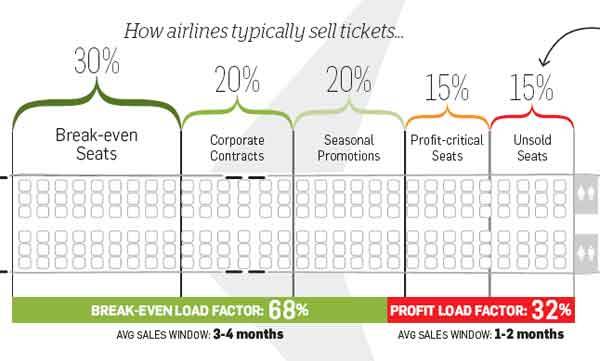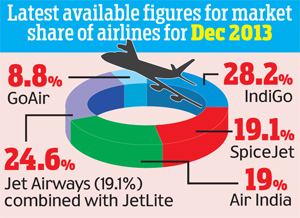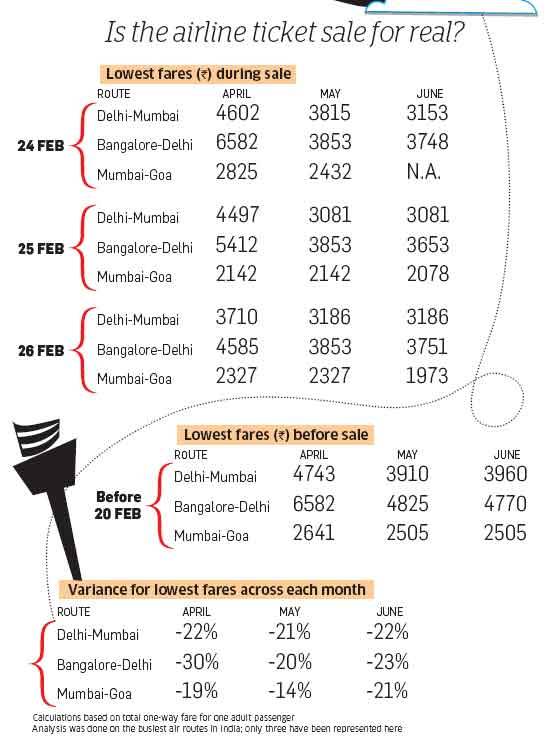30-70% discount on airplane tickets. Reading about it, Raj Shah went online to book tickets for a trip to Delhi in month of August. But before he could decide which date to book ticket for, low cost tickets were shown as unavailable. He was disappointed as he was not unable to get tickets at low prices. Do people really get such tickets, he asked me? Are these discount fares genuine? Airlines do not offer all tickets at same price. They offer different types of tickets at different prices,called as bucket pricing. Tickets priced higher are available in greater numbers while number of cheapest tickets is the least. This article talks about the how airlines price their tickets and why. Some Guidelines to get tickets at less price.
Pricing of AirLine Tickets
Airline ticket pricing is based on demand supply dynamics. An airline is always trying to get maximum value for its seats, but it has to try to sell them all before departure or they will become worthless forever. Just like a grocery store that puts stuff on sale to get food out the door before it spoils, an airline will sell tickets but not at one price but at a range of prices all this to run the airlines efficiently , technically called to have a high load factor. It kinds of put fares in different buckets as shown in image below, hence called as bucket pricing. Passenger load factor, or load factor, measures the capacity utilization of public transport services like airlines, passenger railways, and intercity bus services. Load Factor is generally used to assess how efficiently a transport provider fills seats and generates fare revenue. It is passenger-kilometres flown as a percentage of seat-kilometres available. From EconomicTimes Busting discounted airfares myth: Do airlines really slash ticket prices?
In an ideal scenario, It would be easy for an airline to decide the fares for a flight that consistently shows a 60% load factor. So it would slash fares for more seats to attract passengers. However, unlike a grocery store, the airlines prices seem to go UP as the departure time approaches . Why does this happen?
Imagine that the airline knows in advance roughly how many tickets it will be able to sell at each price. If a plane holds 100 people, it may determine it can sell 105 tickets (assuming 5 no-shows) and it will assign the sale prices in advance. If there are 5 fare buckets, each bucket gets a certain number of available tickets, just like the grocery store assigning each apple a different price based on projected sales and putting them in different buckets. But there is a difference between selling an apple and selling airline ticket. Unlike an apple, which really does start to decrease in quality every minute it sits on the shelf, the ticket will get you there whether you buy one month in advance or one day.When you go to buy a ticket or an apple, you’re very likely to buy the cheapest one, and as those cheaper tickets or apples disappear, you’re left with more expensive options. If you could get that same ticket at the last minute for half price, everyone would wait and there’d be a mad dash at the counter on the day of departure.
In the airline industry, there are two types of passengers: business travellers and leisure passengers. Business travellers are flexible on price, the company is paying, but not on dates. Leisure travellers aren’t flexible on price (the cheaper the better) but are on dates. The airline knows that as the departure date gets closer, business travellers who are still buying tickets really need to get where they’re going on time. People who buy far in advance are typically leisure travellers who just pick whatever’s cheapest. A Delhi-Mumbai flight ticket that normally costs Rs 6,000-8,000 could go up to nearly Rs 15,000 if the purchase was delayed until the eleventh hour. So airlines come up with various algorithms on how many tickets it will sell at what price and it comes out with different prices over the day.
Airline revenue and inventory management algorithms are actually complex and vary across airlines. Prices go up and down for many reasons. No one can really predict when or if a price is going to go up or down. Only the airline knows that. But there are four things that drive prices:competition, supply, demand, and oil prices. Airlines want to fill their planes and maximize profits. They do this by calculating a plane’s load factor. Essentially, this is the percentage of seats sold on a flight. They want this number to be as high as possible. Airlines tend to manage their load factor by constantly changing the price of tickets to fill the plane and get maximum revenue. Airlines are constantly trying to strike a balance between these business travellers and leisure passengers so they can make a profit. Why fly a plane full of cheap fares when you can get people to pay more? Airlines know that a certain number of people will book far in advance if they can find a decent price. Airlines also know that they need to hold a certain number of seats for business travellers who will book last-minute and pay more. Ticket prices jump up and down based on the demand for seats on a plane from these two types of passengers. To maximize their profit, airlines developed sophisticated computer systems that constantly compare booking trends to past sales history. If tickets are selling faster than in the past, the price rises. If a competitor raises fares, the airline will probably raise theirs too. Due to competition, airlines don’t disclose the number of discounted seats.
In India, Routes where load factors are likely to be lower comprise mid-day flights on metro routes and flights during July to September, which is a lean season for airlines.
State of Indian Aviation and Why Airlines launch sales
India has around 61 million domestic fliers. Over the last seven years airlines are estimated to have lost $22 every time a passenger has stepped on board. That’s added up to a $10 billion loss in a market where the number of domestic travellers are expected to triple to 159 million by 2021. Jet Airways (India) Ltd. and SpiceJet Ltd. have posted annual losses, while Kingfisher Airlines Ltd, saddled with $1.4 billion of debt, has been grounded since 2012. India is one of the most expensive aviation markets to operate in the world. State taxes of as much as 30 percent make jet fuel, which contributes to about half an airline’s costs, the costliest in the region. Our article Base fare, UDF,Passenger Fees and Fuel Surcharge: Fees and charges of Airlines talks about how airline tickets are priced. The challenge is how to make money while fares continue to drop even as costs increase. AirAsia’s entry heightens competition in India. Market share of airlines in Indian in Dec 2013 is given in image below
Why do airlines launch sales? At the heart of all these actions is the desire to maximize yields, the money a flight makes.Flying empty seats increases losses but even if the load factor (a measure of occupancy) is high, a flight would make losses if ticket prices are low. There are mainly two gains for airlines from a sale they get to increase cash flows and bring in indecisive passengers.Therefore stimulating early demand to fill seats that would otherwise fly empty is a win-win for all concerned. Early birds do land good deals but most of people are disappointed. EconomicTimes research found that even the lowest fares were lower by only 15-25% than average fares on most sectors, contrary to the perception created by the airline marketing campaigns. From Economic Times Busting discounted airfares myth: Do airlines really slash ticket prices?
Guidelines to get Cheap Airline fare
One doesn’t have to wait for a sale to bag great fares.
Aditya Ghosh, president of IndiGo said in an interview that his airline has a simple pricing policy, book early and you get a low fare but as the plane fills up, fares will rise. “When my mother asks me how she will get a cheap fare or 60,000 passengers ask me the same question, it is the same story.” An economist, Makoto Watanabe, came up with the eight-week rule, calculating that the optimum time to buy an airline ticket is eight weeks before flying.
Experts also say buyers save a bundle if tickets are purchased midweek because Friday, the weekends and Monday inevitably see a rush. An airline is almost certain of a packed plane on a Monday 8 am flight. So it can afford to be miserly with discounts. But on a Tuesday, for the same flight, it has to reduce fares.
Related articles :
- Booking Tatkal Ticket
- Are Air Asia tickets really cheap?
- Base fare, UDF,Passenger Fees and Fuel Surcharge: Fees and charges of Airlines
When do you book your Air place tickets? Have you managed to get tickets at low price? How often have you got your airline tickets at low price?Is there a trick to get ticket at low price. How do you compare the prices of airline tickets? Which travel website do you use and why?







REALLY NICE……
REALLY NICE……
“Due to competition, airlines don’t disclose the number of discounted seats.” – I think airlines are required to submit this info to DGCA. It is one of the reasons spicejet ultra cheap fare sale was stopped by DGCA early April
“Due to competition, airlines don’t disclose the number of discounted seats.” – I think airlines are required to submit this info to DGCA. It is one of the reasons spicejet ultra cheap fare sale was stopped by DGCA early April
Wonderful post……… Nice detailing !!!
Thanjs Bhavani for leaving such nice comment
Wonderful post……… Nice detailing !!!
Thanjs Bhavani for leaving such nice comment
Nice Article. You always write detail articles. keep it up
Thanks Rajan, we try to give complete information hence the articles are detailed. Thanks for encouraging comment.
Nice Article. You always write detail articles. keep it up
Thanks Rajan, we try to give complete information hence the articles are detailed. Thanks for encouraging comment.